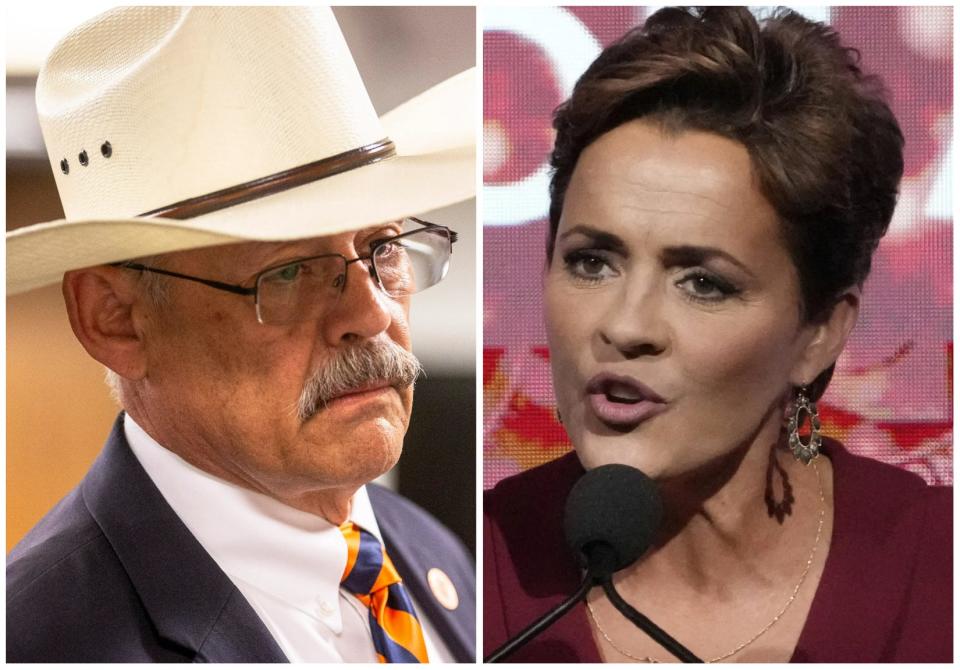SCOTUS to discuss Kari Lake, Mark Finchem machine voting lawsuit. What happens next?
The U.S. Supreme Court is likely to soon decide whether to take up a case brought by Arizona Republican candidates Kari Lake and Mark Finchem challenging the use of machines to count votes.
The court set the duo's case for its conference schedule on Friday, when the justices will discuss cases and vote on which to add to their calendar. The court's decision would be made public as soon as Monday morning.
Legal experts who study the nation's top court have said the justices are unlikely to take the case, in part because they agree to hear just a sliver of the thousands of appeals lawyers put before them each year. Lake and Finchem have gained some support, with the Republican Party of Arizona recently filing a brief backing their case.
Here's where it all stands.
What do Lake and Finchem want?
After being rejected twice, by a federal judge in Arizona and an appeals court, Lake and Finchem took their case to the U.S. Supreme Court in mid-March.
Lake, who is running for the GOP nomination for U.S. Senate, and Finchem, who is seeking a state Senate seat, are challenging the use of electronic machines that count votes, alleging the machines were "surreptitiously altered" and not properly tested nor certified for use, according to their lawsuit and attorney Kurt Olsen.
Their claims have not yet convinced multiple judges and have been refuted by state and county election officials.

But lawyers for Lake and Finchem say they have new evidence, at least some of which was obtained via public records requests and used in Lake's other court cases, without success.
They rely on technical details from tabulator logs and analysis by experts who might be known to Arizonans: Ben Cotton, founder of CyFIR, which was hired as part of the Senate's widely criticized review of the 2020 presidential election, and who took election data and its server to a remote cabin in Montana; and Walter Daugherity, a Harvard-trained lecturer who has ties to groups that push election conspiracies including We the People AZ Alliance, and who told the Arizona Legislature about "projections" that Lake beat Democratic Gov. Katie Hobbs in the 2022 election.
What is the legal issue at play?
Lake and Finchem are asking the nation's top court to find they have standing — a legal basis to bring the case — and allow their claims to be heard.
"Note that Lake’s and Finchem’s claims before the Supreme Court are not about undoing past elections," Olsen wrote in an email. "Their claims here concern whether electronic voting systems in Arizona can deliver a secure and reliable vote consistent with constitutional requirements."
Still, they argue the U.S. Supreme Court should give them a "do-over," "even if the election might produce the same winners."
Olsen and other lawyers working for Lake and Finchem have previously been fined $122,000 for bringing the baseless case, and are facing discipline in Arizona for relying on false information in Lake's case seeking to overturn her narrow loss to Hobbs two years ago.
That election case is still pending before an Arizona appeals court, with oral arguments set for May 2 in Tucson.
Who did Lake and Finchem sue?
The government bodies Lake and Finchem sued — the Pima County and Maricopa County boards of supervisors and the Arizona secretary of state — all notified the U.S. Supreme Court they would not respond to the appeal unless the court directed them to do so.
A deadline for them to respond had previously been set for Wednesday. A spokesperson for the Pima County Attorney's Office said they were unable to comment.
Jeanine L'Ecuyer, a spokesperson for the Maricopa County Attorney's Office that represents the board, said it was normal for parties not to respond at this stage of the case. The office's legal team would respond if asked by the court or if it takes up the appeal, L'Ecuyer said.
JP Martin, a spokesperson for Secretary of State Adrian Fontes, also said it was "standard legal protocol" not to respond. Martin said the appeal "reinforces a pattern of behavior from the lawyers for Lake and Finchem, where the normal legal process is disrupted by filings that fail to meet established guidelines that do not adhere to the court's stringent requirements."
What's been happening in the case since March?
Lake and Finchem's lawyers argue the justices should decide the case and do so quickly.
"The Court can and should accept the evidence in support of the urgency to resolve this matter expeditiously," they wrote. "Left uncorrected, these issues would render the true 2024 election results undeterminable."
The court also received a brief from three outside groups urging it to take the case: The Georgia Republican Party, Republican Party of Arizona and Republican State Committee of Delaware.
The parties asked the court to reverse lower court rulings and send the issue back for judges to consider the "complaint on the merits to ensure that the election law violations of 2022 not be repeated, so that the 2024 election is conducted in accordance with Arizona law."
Reach reporter Stacey Barchenger at [email protected] or 480-416-5669.
This article originally appeared on Arizona Republic: How will SCOTUS handle Kari Lake, Mark Finchem voting machine lawsuit?
